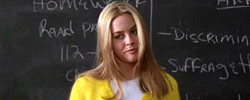Reviews
Cameron Crowe
USA, 1989
Credits
Review by Beth Gilligan
Posted on 03 July 2006
Source 20th Century Fox DVD
Categories Chick Flicks
I don’t want to sell anything, buy anything, or process anything as a career. I don’t want to sell anything bought or processed, or buy anything sold or processed, or process anything sold, bought, or processed, or repair anything sold, bought, or processed. You know, as a career, I don’t want to do that.
Lloyd Dobler
John Cusack has co-written, produced, and/or starred in nearly 50 movies over the past two decades, and yet he can’t seem to escape that enduring image of the lovesick teen hoisting a boom box over his head. As Lloyd Dobler, the quirky, sensitive protagonist of Cameron Crowe’s directorial debut feature, Say Anything, Cusack managed to ingratiate himself with a generation of female moviegoers. Writing in 2003, Chuck Klosterman observes, “For upwardly mobile women in their twenties and thirties,” Cusack is the “neo-Elvis.” He then goes on to marvel at why Cusack isn’t the number-one movie star in America, when “every straight girl [he] knows would sell her soul to share a milkshake with [the actor].”
It is most likely due to this fervent female fanbase that Cusack, along with Hugh Grant, is the only Hollywood actor regularly called upon to headline romantic comedies. In Say Anything, as in many of his prior and subsequent films, Cusack is not the object of infatuation, but rather the active pursuer of romance. While recent years have seen a proliferation of movies and TV shows featuring women on the hunt for Mr. Right (e.g. Bridget Jones’s Diary, Sex & the City), the male equivalent remains largely elusive, making Dobler stand out to an even greater degree.
In addition, it is worth noting that the women Cusack’s characters chase after are often overtly classified as brainy (e.g. Diane Franklin in Better Off Dead, Minnie Driver in Grosse Pointe Blank, Catherine Keener in Being John Malkovich) and—Diane Court (Lloyd’s paramour, played by Ione Skye) excepted—are rarely conventional beauties. While Diane is succinctly described by a fellow student as “a Brain… trapped in the body of a game show hostess,” it is the former attribute that the script continually emphasizes.
The movie begins with Diane delivering the valedictorian speech at her and Lloyd’s high school graduation, in which she admits her fear and uncertainty about the future. While the rest of her classmates look on with boredom, Lloyd sits transfixed, and shortly thereafter announces to his two best friends (both of whom are female) his intention to date her. Although he faces skepticism on all fronts, his steady mix of patience, humor and sincerity eventually wears Diane down, and the two plunge into a relationship.
Shortly after they lose their virginity to each other, she abruptly dumps him. In addition to her imminent departure to study in England on a fellowship, Diane has allowed herself to be swayed by the opinions her father, an arrogant, controlling man who dislikes Lloyd. This incident marks yet another recurrence in Cusack’s career: here, as in The Sure Thing, Better Off Dead, and High Fidelity, the actor plays a dumpee or romantic reject. While many romantic comedies are content to show women as blubbering messes post-break-up (e.g. When Harry Met Sally…, Something’s Gotta Give), Say Anything again offers female audience members a rare onscreen glimpse of male vulnerability. This is not to say Lloyd curls up on his sofa with a carton of Ben & Jerry’s ice cream and An Affair to Remember; while he is placed in situations female audience members may relate to and is unfailing chivalrous, he is never effeminate.
In many ways, his screen persona heralds a broader transition that was occurring in Hollywood during the time Say Anything was released. Not only was the industry steadily increasing its output of romantic comedies, but, as film scholars Susan Jeffords and Fred Pfeil have pointed out, the tough, beefed-up, independent vigilante heroes of the 1980s (Bruce Willis in Die Hard, Mel Gibson in Lethal Weapon, Sylvester Stallone in Rambo) were giving way to a more sensitive, emotionally open, and nurturing type of leading man (e.g. Harrison Ford in Regarding Henry, Tom Cruise in Jerry Maguire, William Hurt in The Doctor).
There’s a moment in Say Anything, however, that may well sum up Lloyd’s enduring appeal. After having been dumped by Diane, he stands in a guitar shop with his two best friends, citing pride as the reason he refuses to call her. After all, he explains, “I’m a guy.” With a warm, knowing smile, his friend Corey replies, “You’re not a guy… The world is full of guys. Be a man.” Shortly thereafter, he shows up outside Diane’s window, lifting that boom box blaring “In Your Eyes” above his shoulders.
More Chick Flicks
-

The Truth About Cats & Dogs
1996 -

Say Anything
1989 -

Gas Food Lodging
1992 -

Pretty Woman
1990 -

Walking and Talking
1996 -

Mean Girls
2004 -

Fried Green Tomatoes
1991 -

Private Benjamin
1980 -

Clueless
1995 -

Erin Brockovich
2000 -

The Bridges of Madison County
1995 -

Bridget Jones’s Diary
2001 -

Working Girl
1988 -

Bend It Like Beckham
2002 -

Bring It On
2000 -

Ghost
1990 -

Truly Madly Deeply
1991 -

The Last of the Mohicans
1992
We don’t do comments anymore, but you may contact us here or find us on Twitter or Facebook.



